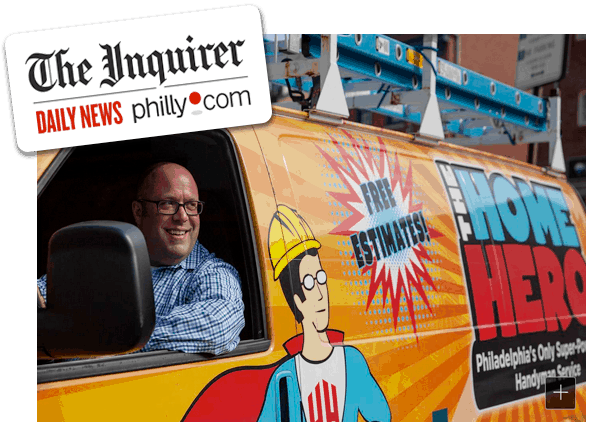Philadelphia Handyman in the Press (Philadelphia Inquirer)
We are proud to be the Philadelphia Handyman in the Press, see the full article in the Philadelphia Inquirer.
The Philadelphia Inquirer highlights The Home Hero bringing VIP customer service to the Philadelphia handyman business.

HEATHER KHALIFA / STAFF PHOTOGRAPHER
‘The Home Hero’ brings VIP customer service to the handyman business
by Christian Hetrick. Posted: October 26. 2018
Lauren Zeitlin had several stressful experiences with home contractors before she was rescued by the Home Hero. Zeitlin, who Jives in Southwest Center City, said contractors would start a project, then disappear for weeks. They wouldn’t respond to phone calls and emails, leaving her in the dark. “The work may have been fine, as well as the price, but the headache of not knowing when the project was going to be done, not communicating… ,” she said.
Then, five years ago, she contacted Peter Rose, owner of the Home Hero, a Philadelphia handyman business. The company specializes in small projects – say, drywall repair or mounting a television – and emphasizes “a heroic commitment to customer service” in an industry that has long drawn the ire of consumers. Zeitlin now calls the Home Hero for all sorts of work, advice, and referrals.
“The level of customer service I’ve gotten from his company is above and beyond,” said Zeitlin. “Everything is really organized. You get the estimate right away over email. You get the invoice right away over email.”
Launched in 2010, the Home Hero saw its revenues grow 40 percent from 2015 to 2017, putting it on the Philly 100 list of fastest growing companies in the region. The business collected $839,000 in revenue in 2017, compared with $600,000 two years earlier. Rose, who was laying tile by himself after he lost his job in 2009, now has 15 employees and just signed a lease for an 1,800-square-foot garage in Pennsport.
Rose, a 44-year-old former ad salesman, said customer service separates his business from the “guy in a van.” Rose plays the quarterback — training, insuring, and coordinating schedules for his workers and partners. Consumers can receive “virtual quotes” through photos or FaceTime chats instead of scheduling in-person estimates. The company prices by the hour for simple projects and uses flat rates for more complicated matters.
“We’ve identified a huge need in the marketplace for this type of work. I’ve met with over 10,000 customers, and the thing that I’m constantly hearing over and over — which makes me know we’re onto something — is, ‘Oh, my God, I can’t get someone to call me back. You’re the first person to call me back. The first person to show up on time,'” Rose said. “There is such stress in the marketplace for a service like this.”
Home contractors were the fifth-most-complained-about industry last year in the Eastern Pennsylvania and Washington metropolitan areas, according to the Better Business Bureau. The bureau received more consumer inquiries about home contractors than any other type of business in the region in 2017.
Rose acknowledged that he charges “double the price” of a sole proprietor, but said clients are OK with the premium because of the customer service. Typically, he charges $225 for two hours of work or $500 for a full day. The Home Hero has come out for only an hour ($150 plus supplies) to fix a door knob for a previous customer, an offer he doesn’t advertise.
A large part of the service is talking customers out of things, Rose said. He once advised a couple against installing a trapeze net to prevent a child from crawling over a knee ledge and falling five stories to a foyer below. Rose worried the net would only encourage the child to jump. His employees built a slightly taller wall instead.
“Sometimes it’s talking them out of a job that we could do for them because I know at the end of the day, they’ll come back for me for something else,” he said.
Small drywall repairs make up 30 percent to 40 percent of the business, Rose estimated, followed by baby-proofing homes, which makes up 10 percent to 20 percent and is a “gateway drug” for more work down the road.
Ironically, for a former advertising salesman, Rose doesn’t spend much on ads, dropping between $5,000 to $10,000 per year. That includes two Uber cars wrapped with the Home Hero logo that run routes downtown. The logo is a man with a hardhat, tool belt, and red superhero cape.
Zeitlin recalled a time when the Home Hero saved the day.
She bought a new washing machine from another company that refused to move it to the basement. It was left in the living room.
Rose’s employees were at her home later doing other work and carried the appliance downstairs.
“They were willing to do what another company wasn’t willing to do to make our lives easier,” Zeitlin said of the Home Hero.